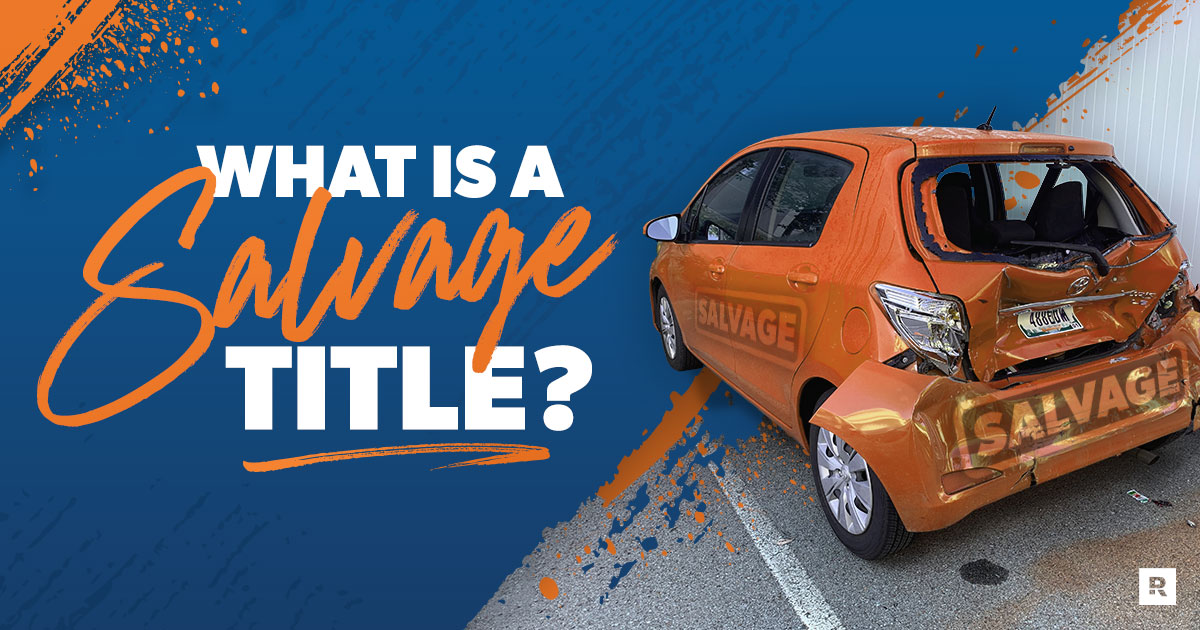
Key Takeaways
- A salvage title is when an insurance company decides a vehicle is a total loss, making the current registration and title no longer valid—and making the car illegal to drive.
- These vehicles can be repaired and resold, giving them a “rebuilt title,” but they may have hidden damage that affects performance and safety.
- While they can be cheaper upfront, the expense to repair them, their long-term reliability, and the challenge of reselling them make them a risky purchase.
So you’ve been following the Baby Steps hardcore: You’ve got 1,000 bucks in your emergency fund, two jobs and a beater of a car. The plan is working.
Then you back into a mailbox, crush your bumper, and scrape up your doors. Your car now looks like it could give Steve Martin’s ride from Plains, Trains and Automobiles a run for its money. The insurance company takes a look and says it’s not worth fixing. Your car’s totaled—but it still drives!
You make a deal with your insurer to keep your car, but now it has a salvage title.
What does that mean? Can you still drive it? How do you get rid of a salvage title? Don’t worry, the answers to all this and more are coming up.
What Is a Salvage Title?
Generally, when an insurance company decides a vehicle is a total loss (it costs more to fix it than the vehicle is worth), the current registration and title are no longer in effect, and the state issues it a salvage title. This kind of title is often called a branded title, meaning the title is marked to let any buyers know the vehicle has serious issues. Once a car is issued a salvage title, it’s no longer legal to drive it.
Common reasons why a car would be issued a salvage title include collision, flood, fire, vandalism, hail or theft. With that last one, if the car hasn’t been found after a while, the insurance company pays the owner the actual cash value (ACV) of the car. If the car is found later, the state issues a salvage title, and the insurance company sells the car.
Salvage Title vs. Rebuilt Title
It’s easy to get salvage title and rebuilt title confused because they’re both signs that a vehicle experienced a lot of damage or something severe happened to it. But they are very different.
Salvage titles are issued when a vehicle isn’t fit to drive and is either going to be sold for parts or sold to be repaired.
A rebuilt title is issued after the salvage titled car has been repaired and passed a basic state safety inspection.
Salvage Title vs. Rebuilt Title
|
Salvage Title |
Rebuilt Title |
|
Illegal to drive |
Legal to drive |
|
Needs to be repaired or sold for parts |
Already been repaired |
|
Issued before a rebuilt title |
Issued after salvage title |
How Does a Salvage Title Work?
So what’s the point of a salvage title? Anytime a vehicle is sold (even if the buyer doesn’t plan to drive it), the seller needs a title to prove ownership—and transfer ownership to the buyer.
Don't let car insurance costs get you down! Download our checklist for easy ways to save.
Here’s how that usually works with a salvage title: An insurance company totals a car (so they give the owner the actual cash value (ACV) of the car and the owner turns the car over to the carrier). Once the car is totaled, its title and registration are no longer valid, and the state issues a salvage title to the insurance company. The company then usually sells the now salvage titled vehicle to a salvage dealer. The dealer either scraps the car for parts or fixes it if they think it’s worth their while. If they fix it, the car will then get a rebuilt title.
It’s more common to see late model cars with salvage titles for sale because they have low mileage and other attractive features that could convince a buyer it’s worth the risk. Plus, many states don’t issue salvage titles to older model vehicles.
With older cars or cars that have lots of miles, just a little bit of damage is enough to convince insurance companies it’s not worth repairing. But that doesn’t mean the driver is ready to give up their totaled car—especially if it’s paid-for and still roadworthy.
The good news is, it’s possible to get back on the road even after you get a salvage title. You’ll have to prove to the state that your car is safe to drive (through paperwork on repairs or an inspection) so you can get a rebuilt title—because, remember, it’s illegal to drive with a salvage title.
Why You Shouldn’t Buy a Car With a Salvage Title
Are you a mechanic? Are you unemployed? Do you literally have so much time on your hands that you can afford to watch 198 hours of Buddy’s DIY YouTube channel to figure out how to repair a totaled car? If so, you might be a great candidate to buy a car with a salvage title.
If not, we’re going to recommend you don’t.
Cost
Yes, those rock bottom prices for salvage vehicles are eye-catching, but in pretty much all cases, salvage cars require at least some major repairs to be roadworthy—and likely more than just some.
Insurance companies don’t like to pay out if they can avoid it. So if the insurer decided the vehicle wasn’t worth repairing and chose to pay the owner instead, then you should probably trust their judgement and know it’s not worth paying someone to repair it.
With a salvage vehicle, there’s a lot of opportunity for unseen problems. As you or a mechanic peel back the layers, you may find the damage worse than anyone thought.
Drivability
Like we’ve mentioned a couple times already, it’s illegal to drive a car with a salvage title. So, if you need a vehicle to hit the road immediately, a salvage car isn’t a good option.
Safety
If you’re thinking, Eh, I don’t need a car this instant and I think I can get this thing fixed pretty cheap, there’s still another concern to keep in mind: safety. Even if you get it up and running, pass the state’s inspection, and get a rebuilt title, you can never be sure it’s as reliable as a car that hadn’t been totaled.
Generally, a salvage title means the car has been though significant trauma or is experiencing a major problem with a very expensive part. Not only is unseen damage expensive if you find it, if you don’t, it could cost you your life.
Shady Dealers
Even if the title clearly proclaims the car is salvage, you’re still trusting whoever’s selling the vehicle to tell you how the car got the salvage title. The unknowns make the deal a lot riskier. You know the car has damage. You don’t know if the seller is telling you everything.
Most reputable car dealerships don’t sell salvage title vehicles, so there’s a good chance you’ll be dealing with an individual seller who’s more motivated to make the sale than to be honest with you. Also, once the deal is done, that car is yours no matter how bad things turn out to be under the hood.
Resale
If after driving your beloved branded vehicle for a while, you decide it’s time for a better ride, you’ll have a hard time selling your car. Buyers won’t be banging down your door to buy a car with a salvage title in its past.
Why Buy a Car With a Salvage Title?
Like we said earlier, this could be your opportunity to shine if you’re a grease monkey with a lot of time on your hands. A salvage title drags the price tag way down and creates an opportunity for a skilled mechanic to grab a deal.
But that said, not all salvage title cars are repairable. Nobody but God could resurrect a Ford Fiesta after an 18-wheeler ate it for breakfast. And we’re willing to bet God wouldn’t bother.
This brings us to the other reason to buy a salvage title vehicle: parts. But again, this makes the most sense for a mechanic.
How to Buy a Car With a Salvage Title
If you’re thinking you may want to take the plunge and buy a vehicle with a salvage title, here are a few tips to help you decide.
Inspect the vehicle yourself.
If you’re planning to repair the car yourself, getting under the hood so to speak, will give you a good idea of what you’re in for. Make sure to ask for the original insurance adjuster’s report that outlines why the car was totaled.
Take it to a mechanic.
If you plan to have a mechanic do the repairs or think the vehicle doesn’t need any, try to arrange for your mechanic to do a thorough once-over on the car.
Look up the title.
Check to see if there’s any vehicle history logged on the title. You may find something like a lemon title that tells you the car is a definite no.
Look up the VIN number.
This is another way to get a look at the vehicle’s history. You may find out the vehicle sustained more damage than the guy with the shiny hair is telling you.
These are great places to check:
- Carfax
- Kelley Blue Book
- VINCheck from the National Insurance Crime Bureau
- National Motor Vehicle Title Information System
- AutoCheck
Get quotes for insurance on the vehicle.
Insurers won’t cover a salvage titled car, but many offer some insurance once a car earns a rebuilt title through repairs. This insurance is often pretty pricey, however. Shop quotes for the vehicle you’re looking at (using a rebuilt title) to make sure you know the full cost of buying a salvage title vehicle. An independent insurance agent can compare all available quotes and give you the best one.
Save Money With an Insurance Bundle
A RamseyTrusted pro can hunt down the best car and home insurance deals to get you quality coverage without breaking the bank.
Look up state laws.
Here’s a final bit of advice: If you’re looking to buy a vehicle with a salvage title, make sure to read up on your state’s laws around them first.
Each state sets its own rules around salvage titles, and they can vary a lot. For instance, in Oklahoma, you don’t have to surrender the license tag if your vehicle is issued a salvage title. Some states only issue salvage titles to vehicles under a certain age, like 10 years old.
How to Keep Your Car After It’s Been Totaled
If your car has been totaled but you want to keep it, you have some work ahead of you. Depending on your state’s laws, it might go a little differently, but this is the general process:
First, let your insurer know you want to keep the car. Next, you’ll need to surrender your car’s license plates to your state’s DMV and apply for a salvage title (in some states, like California, you must do this within 10 days of your car being declared a total loss).
Your insurer will then pay you the ACV of the vehicle minus the salvage value (what they would have gotten for the car if they’d kept it and sold it for salvage). From this point, it’s up to you to get the car repaired (if it needs repairs to be roadworthy) and take it to the state for inspection. Which department or bureau inspects it will be different in your state (in Ohio, for example, it’s the State Highway Patrol).
After your car passes inspection, the DMV will issue it a rebuilt title. Your car can then be registered and on the road again!
If your car is old (in some states, over 10 years), the process may be different. Your DMV or insurance company can tell you what you need to do.
How to Insure a Car With a Salvage Title
If you’ve made it this far, it should be pretty clear that you can’t get insurance for a vehicle with a salvage title. It is illegal to take them on the road—even if they’re drivable.
But a salvage title doesn’t mean you’ll never be able to get insurance—it just means you have a few more hoops to jump through before you can take your new ride on the road.
- Repair it. (Obviously, if you’re buying a damaged vehicle, you’ll need to fix it.)
- Pass state safety standards/inspection.
- Apply for a new title. (If you pass the state standards for repair, they’ll issue you a rebuilt title.)
- Get insurance (many companies will only offer liability coverage).
Once you’ve got a rebuilt title in hand, you can insure your previously salvage titled car. Remember, because of the high risk of future issues, insurance companies usually charge more for coverage on these vehicles. Also, it’s unlikely they’ll give you full coverage, which would include comprehensive or collision coverage. The best you can look for is liability with personal injury protection and uninsured motorist coverage.
To make sure you get the best deal, talk with a local insurance pro who can shop quotes and make sure you get the best option. Even if you already have car insurance, talking to an independent insurance agent could save you a bucket-seat load of cash on premiums because they often find a better deal.
Connect with a RamseyTrusted independent insurance agent today!
Get trusted coverage that fits your budget.
When you work with a RamseyTrusted pro, you can feel confident knowing they’re going to find the best policy for you at the best price.




